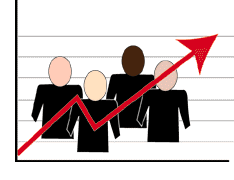 Melissa Lauber
Melissa Lauber

 Melissa Lauber
Melissa Lauber
A report that shows companies that have created diversity in the workforce are more profitable, has been largely overlooked in recent news reports of last month's $176 million discrimination settlement with Texaco.
Concentrating on lurid details of audio tapes that caught racist remarks made by executives of the $35 billion a year oil giant, most of the coverage in the press reported details of the settlement of the 1994 suit, that had charged that whites received the best promotions and biggest raises.
It's hard to know the level of racism in the board rooms and back rooms of corporate America, said the Rev. Maurice Culver of Project Equality, Inc., an ecumenical organization in Kansas City that addresses equal employment opportunities. "Most of this stuff never sees the light of day."
For example, said Culver, "in a very important study, the federal Glass Ceiling Commission found that during the last 10 years, the proportion of African-Americans holding management positions has only ranged between five and seven percent. They continue to be invisible at the very top level of companies."
In 1994, the Commission also issued findings that indicated diversity has a positive impact on the bottom line. A report on the economic imperative of managing diversity, that includes more than 70 pages of analysis, concluded simply: "Organizations which excel at leveraging diversity (including the hiring and advancement of women and nonwhite men into senior management jobs, and providing a climate conducive to contributions from people of diverse backgrounds) will experience better financial performance in the long run than organizations which are not effective in managing diversity."
One of the many statistics used to bolster this finding was a study, by Covenant Investment Management, which rated the performance of the Standard and Poors 500 on a series of factors relating to the hiring and advancement of women and nonwhites.
The study found, the annualized return for the 100 companies which rated lowest in equal employment opportunities issues, average 7.9 percent, compared to 18.3 percent for the 100 companies that rated highest in their equal employment opportunities. "Thus, the stock market performance of the firms that were high performers on the glass ceiling-related goals was 2.5 times higher than that of the firms that invested little in glass ceiling-related issues."
"Competitiveness Through Management of Diversity: Effects on Stock Price Valuation," another report, found that firms that received Department of Labor awards for their success in implementing voluntary affirmative action policies are rewarded for their success with a boost in their share price within 10 days of the announcement.
The bottom line, Culver said, "is that diversity is profitable," especially in a society which by the year 2050 will be evenly split between whites and nonwhites.
However, for those corporations which refuse to recognize the importance of learning to embrace and manage diversity within the work place, Project Equality offers an incentive.
With 30 million affiliate members from a wide range of faith groups, Project Equality provides Christian consumers with a Buyer's Guide that enables people of faith to support companies who practice diversity and to give training and information to corporations on the value of equal employment opportunities.
While public interest in situations like the settlement of the Texaco case is important, Culver says, "racism tends to be more latent." Responding to racism, he cautions, means taking a stand when the media has moved on to the next story. If people do not react, even outside the glare of public media, we will all be swept away "in a tide of injustice," he said.
How to Become Involved in This Issue
Contact Project Equality at 6301 Rockhill Drive, Suite 315, Kansas City, MO 64131 or call (816) 361-8997.
Project Equality's Buyer's Guide is available to individuals for $35. Congregations can buy the guide on a sliding scale, based on the size of their membership, beginning at a price of $50.
To learn more about the Interfaith Center on Corporate Responsibility (ICCR) write to 475 Riverside Dr., Room 566, New York, NY 10115 or call (212) 870-2293.
Related Web Sites of Public Interest
The following web sites may provide additional information related to this article:
Business for Social Responsibility
Copyright © 1998 Villagelife.org Inc. All Rights Reserved